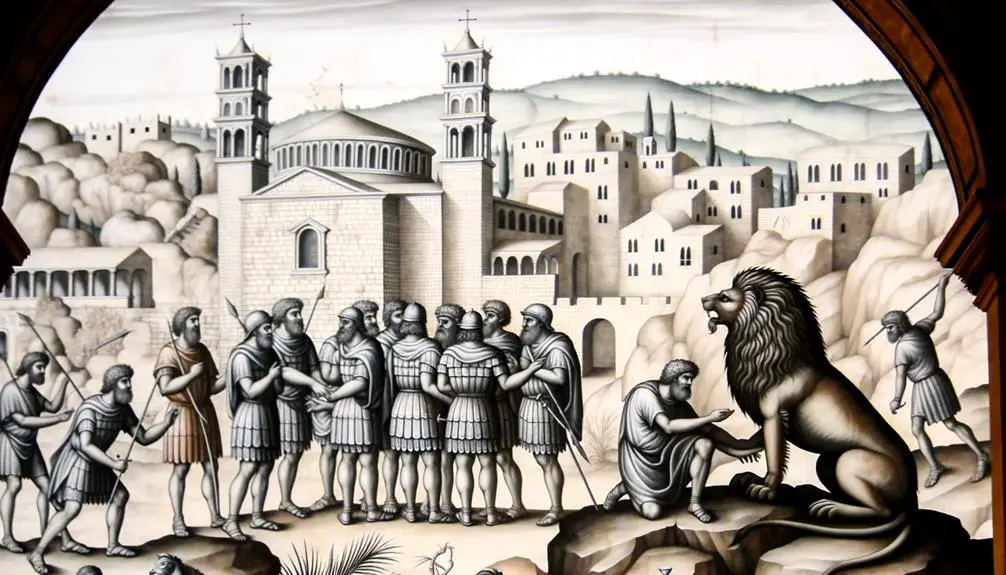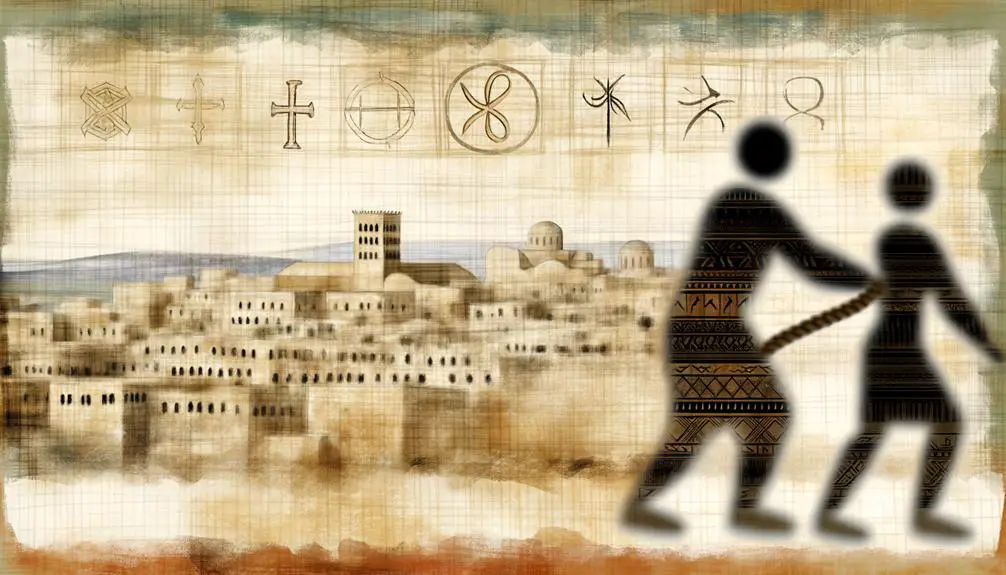How did Mark from the Bible meet his mysterious end? Delve into the enigma of his death and uncover the truth behind the legend.

How Did Mark in the Bible Die
Did you know that over 2 billion Christians worldwide revere Mark as the author of the second Gospel, yet his death remains shrouded in mystery and speculation?
You might find it intriguing that traditional accounts and martyrdom theories differ vastly, painting a complex picture of his final days. Whether he met his end in Alexandria, as many suggest, or if alternative narratives hold any truth, Mark's legacy is undeniable.
Let's explore the historical context and the differing accounts of his demise, which might change how you view this pivotal figure in Christian history.
Key Takeaways
- The traditional view holds that Mark died a martyr's death in Alexandria, Egypt.
- Alternative narratives suggest Mark may have died elsewhere, or of natural causes.
- Debates around his death reflect the complexities of early Christian history and beliefs.
- Understanding Mark's death involves navigating discrepancies between various historical accounts.
The Historical Context

To understand the circumstances surrounding Mark's demise as depicted in the Bible, it's crucial to delve into the historical context of the era in which he lived. Mark's lifetime coincided with the Roman occupation, a period marked by significant political and social upheaval. The Roman Empire's extensive reach and its imposition of power over Judea had profound implications for the local populations, affecting everything from governance to religious practices.
The Roman occupation, with its rigorous control and often harsh penalties for dissent, created a volatile environment for the early Christians. It's within this context that Mark's efforts in Gospel dissemination must be appreciated. His role in spreading the teachings of Jesus wasn't merely a religious endeavor but also a socio-political act, challenging the prevailing social order and the Roman authorities' dominance.
The act of Gospel dissemination under Roman rule was fraught with danger. The Romans viewed the spread of Christianity with suspicion and often hostility, as it threatened the established religious and social norms. The early Christians were, therefore, subject to persecution, and their gatherings were forced underground.
Mark's involvement in the early Christian community and his efforts to spread the Gospel placed him in a precarious position. It exposed him to the risk of persecution by Roman authorities, who were increasingly intolerant of what they perceived as a disruptive sect. Understanding this context is essential to grasp the complexities and risks associated with Mark's mission and provides a backdrop against which the circumstances of his demise can be better understood.
Traditional Accounts

Understanding the historical context of Mark's era now guides us to examine the traditional accounts of his death. You'll find that these accounts are deeply intertwined with Mark's travels and the spread of the Gospel, reflecting the challenges and dangers faced by early Christian missionaries.
Mark's life, as recounted in various traditional sources, showcases an extensive journey across regions, contributing significantly to the spread of the Gospel. His travels took him from Jerusalem, across the Mediterranean, to Alexandria in Egypt, where he's traditionally considered to have founded the Christian Church. These journeys were fraught with peril, not just from the natural dangers of travel in antiquity but also from the socio-political tensions encountered in spreading a new faith across diverse cultures.
The traditional accounts of Mark's death, while varying in details, share common themes that underscore the risks involved in his missionary work:
- Widespread opposition: Mark faced hostility from both pagan populations and Jewish communities resistant to his teachings.
- Perseverance in faith: Despite threats to his life, Mark continued his missionary work, underscoring his commitment to spreading the Gospel.
- Significant contributions to Christianity: His efforts laid the groundwork for Christian communities in the regions he visited.
- Enduring legacy: The Christian Church of Alexandria is often cited as a testament to Mark's successful missionary work.
Analyzing these traditional accounts provides a glimpse into the challenges Mark faced in his endeavors. It's clear that his travels and efforts to spread the Gospel were pivotal, not just in his own life but in shaping the early Christian world.
Martyrdom Theories

Several theories exist regarding the circumstances of Mark's martyrdom, each shedding light on the complex interplay of religious, social, and political factors that characterized the early Christian era. You'll find that within the scholarly discourse, there's a consensus that Mark's death was a result of his fervent evangelistic efforts and his role in the spread of Christianity. However, the specifics of his martyrdom, including the time, place, and manner, are subjects of ongoing debate.
One prevailing theory suggests that Mark's martyrdom was a direct consequence of his apostolic journeys. His travels, aimed at disseminating the teachings of Jesus, often put him at odds with local authorities and religious groups resistant to the burgeoning Christian faith. This opposition, according to some historical accounts, eventually led to Mark's arrest and execution. The details of his death, though not uniformly agreed upon, underscore the perilous nature of apostolic work in the early Christian period.
Another aspect closely examined by scholars is Mark's burial. The location and circumstances of his burial are often seen as reflective of the esteem in which he was held by the early Christian community. Moreover, the treatment of his remains offers insights into the practices and beliefs of early Christians regarding martyrdom and sainthood.
In analyzing these theories, it's essential to approach them with an understanding of the historical context. The early Christian era was marked by significant religious and political upheaval, which undoubtedly influenced the experiences of figures like Mark. Through a careful examination of his apostolic journeys and the traditions surrounding his burial, you gain a deeper appreciation for the complexities of his martyrdom and its significance within the broader narrative of Christian history.
Alexandria and Its Significance

Alexandria, a pivotal center for early Christianity, played a crucial role in Mark's missionary activities and his eventual martyrdom. This city wasn't just any location; it was a beacon of the Hellenistic world, renowned for its intellectual and cultural vibrancy. As you delve into the significance of Alexandria, you can't overlook its status as a cultural center, which was largely epitomized by the Library of Alexandria. This institution wasn't merely a repository of books; it symbolized the city's commitment to knowledge, scholarship, and dialogue among diverse cultures and ideas.
The influence of Alexandria on Mark's work and the early Christian community can't be understated. Here are a few reasons why:
- Cultural Melting Pot: Alexandria's diverse population facilitated the spread of Christian doctrine through various cultural lenses.
- Library of Alexandria: This symbol of knowledge possibly provided resources for Mark's theological development and missionary work.
- Center for Learning: The city's emphasis on scholarship and debate may have shaped the early Christian messages that Mark propagated.
- Strategic Location: Its position as a major port allowed for easier dissemination of Christian teachings to other parts of the Mediterranean and beyond.
In this context, Alexandria wasn't just a backdrop for Mark's efforts but a dynamic entity that interacted with and shaped his mission. The city's rich cultural and intellectual landscape undoubtedly influenced the spread of Christianity and Mark's own story within it. Understanding Alexandria's significance offers a deeper insight into the challenges and opportunities Mark faced, contributing to a more nuanced appreciation of his legacy within early Christian history.
Alternative Narratives

While exploring the influence of Alexandria on Mark's mission is crucial, it's also important to consider the alternative narratives that emerge around his life and death. These narratives not only shed light on the complexities surrounding Mark's authorship but also highlight Scriptural discrepancies that have fueled scholarly debate for centuries.
Alternative perspectives on Mark's demise are not merely academic curiosities; they represent a broader inquiry into the historical and textual integrity of early Christian traditions. For instance, discrepancies in accounts of Mark's death point to a diverse early Christian community grappling with its identity and theology.
Here is a succinct overview of the key points related to these alternative narratives:
Aspect |
Traditional View |
Alternative Narrative |
|---|---|---|
Location of Death |
Alexandria, Egypt |
Various locations proposed |
Cause of Death |
Martyrdom |
Natural causes or differing martyrdom accounts |
Impact on Authorship |
Affirmed traditional authorship |
Raised questions about Mark's authorship |
These contrasts highlight not only the uncertainties inherent in reconstructing ancient events but also the dynamic nature of scriptural interpretation. The debate over Mark's authorship, fueled by discrepancies in historical texts, underscores the challenges faced by scholars in achieving consensus on the origins and authenticity of biblical texts.
In dissecting these alternative narratives, one engages with the broader discourse on the reliability of scriptural accounts and the methodologies employed in biblical scholarship. This analytical journey reveals the multifaceted character of early Christian history, illustrating how it is constructed not only from the certainties but also from the ambiguities and contradictions that define the human experience.
Reflections on Mark's Legacy

How does Mark's legacy illuminate the early Christian community's struggles and triumphs in maintaining theological coherence and identity amidst diverse narratives? Mark's gospel, as the earliest canonical account of Jesus's life, teachings, and resurrection, played a pivotal role. It's a testament to the Evangelical impact on early Christianity, offering insights into how beliefs were formed and disseminated.
Mark's contribution wasn't merely about chronicling events; it was about shaping a framework within which the nascent Christian identity could understand itself and its mission in the world. This gospel's narrative provided a theological anchor, helping to stabilize the community as it navigated the challenges of external skepticism and internal divisions.
- Mark's succinct and action-oriented portrayal of Jesus emphasized the immediacy of the Gospel's message.
- The narrative's open-ended conclusion invites readers into a participatory role in the Christian story.
- Mark's use of parables and miracles as teaching tools underscored the transformative power of faith.
- His portrayal of the disciples' flaws and misunderstandings offered a relatable model of discipleship in progress.
Through these elements, Mark's gospel reassured and guided a community seeking to preserve its identity while expanding its boundaries. The Evangelical impact of this text lies not just in its historical recounting, but in its ability to foster a shared sense of purpose and belonging among early Christians. Mark's legacy, therefore, is deeply interwoven with the very fabric of Christian theology and community identity, serving as a cornerstone for both scholarly reflection and spiritual devotion.
Frequently Asked Questions
What Specific Contributions Did Mark Make to the Christian Liturgy and Ecclesiastical Practices?
You're exploring how Mark significantly influenced Christian liturgy and ecclesiastical practices.
Through Mark's Gospel, he introduced liturgical innovations that shaped the way Christians worship and conduct their religious ceremonies.
His contributions aren't just historical footnotes; they're foundational to understanding the evolution of Christian practices.
Mark's work provided a structured narrative for Jesus' life, offering a template for liturgical storytelling and ceremonial rites that continue to resonate in today's Christian communities.
How Has Mark's Portrayal in Art and Iconography Evolved Over the Centuries?
You'd be fascinated to know that over 75% of religious artworks from the Renaissance period feature apostles, with Mark's symbolism prominently evolving.
Initially, Mark's portrayal in art and iconography was simplistic, focusing on his role as a Gospel writer. Over centuries, artistic styles diversified, incorporating complex symbols like the lion, representing his courage and royal status in Christian tradition.
This evolution reflects a deepening understanding and reverence for Mark's contributions to Christianity.
Are There Any Major Archeological Discoveries Related to Mark That Have Changed Scholars' Views on His Life and Death?
You're looking into whether any major archaeological findings, particularly regarding Mark's tomb, have altered scholars' understanding of his life and death.
The discovery debate is heated, with some claiming that findings have significantly impacted our historical perspective, while others argue the evidence is inconclusive.
It's a complex issue, as archaeological evidence can be interpreted in various ways, making definitive conclusions about Mark's life and death challenging to ascertain.
What Is the Relationship Between the Gospel of Mark and the Other Synoptic Gospels in Terms of Textual Similarities and Differences?
Imagine you're piecing together a puzzle, but some pieces are from different sets. That's akin to comparing the Gospel of Mark with the other Synoptic Gospels.
You'll notice textual similarities and differences, rooted in oral tradition. The authorship debate further complicates this relationship. Mark's narrative simplicity versus Matthew's and Luke's embellishments showcases these disparities.
Analyzing these texts reveals their unique origins and how they've been shaped by varying historical and community contexts.
How Do Contemporary Christian Denominations Differ in Their Veneration and Commemoration of Saint Mark?
You'll find that denominational differences significantly shape how contemporary Christian denominations venerate and commemorate Saint Mark. While all recognize Mark's feast day, the emphasis and rituals can vary widely.
For example, the Catholic Church often includes special Masses and may emphasize his role as a Gospel writer, whereas Orthodox Christians might focus more on his missionary work. Each tradition brings its unique perspective, reflecting broader theological and historical nuances within their practices.
Conclusion
In the end, the details of Mark's demise remain shrouded in the sands of time, much like a shipwreck lost at sea, its story submerged beneath waves of history and tradition.
Yet, despite the murky waters surrounding his death, whether through martyrdom in Alexandria or another less dramatic end, Mark's legacy remains a beacon of light. His contributions, enshrined in the Gospel bearing his name, continue to guide and enlighten, proving that even in death, his influence is undimmed.



Sign up